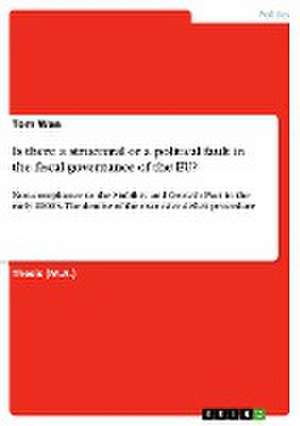Is there a structural or a political fault in the fiscal governance of the EU?
Autor Tom Wanen Limba Engleză Paperback – 22 noi 2016
Preț: 138.57 lei
Nou
Puncte Express: 208
Preț estimativ în valută:
26.52€ • 27.53$ • 22.11£
26.52€ • 27.53$ • 22.11£
Carte tipărită la comandă
Livrare economică 18-24 martie
Preluare comenzi: 021 569.72.76
Specificații
ISBN-13: 9783668310247
ISBN-10: 3668310246
Pagini: 52
Dimensiuni: 148 x 210 x 4 mm
Greutate: 0.09 kg
Ediția:1. Auflage
Editura: GRIN Publishing
ISBN-10: 3668310246
Pagini: 52
Dimensiuni: 148 x 210 x 4 mm
Greutate: 0.09 kg
Ediția:1. Auflage
Editura: GRIN Publishing
Notă biografică
As the Research Director in European Politics at the Global Studies Institute in Hong Kong, an institution set up by renowned international relations scholar Simon Shen, I am one of the youngest and most avid multi-platform commentator in European affairs in Hong Kong. With a degree in history, and a master¿s of science degree in EU politics specialized in the governance of the European Union from the prestigious London School of Economics and Political Science, I have written dozens of commentaries on several publications in the Greater China region, as well as guest to numerous TV and radio broadcastings in Hong Kong. A majority of my articles can be seen in the Hong Kong Economic Journal, while I've also written articles for UDN Global (¿¿¿), the Taipei-based newspaper, and the Guangzhou-based Nanfeng Chuang Journal (¿¿¿).
In light of the recent Brexit incident, I've been quoted in the Hong Kong Economic Journal, published extensively on online platforms such as the Initium and Insight Post, while making several broadcastings produced by the RTHK and TVB, including a lengthy interview featured in "On the Record" (http://mytv.tvb.com/tc/cat_news/ontherecord/257528) as well as Pentaprism II ¿http://programme.rthk.hk/rthk/tv/programme.php?name=tv/pentaprismII&d=2016-06-24&p=4101&e=362234&m=episode). My stance on the referendum has been a simple one; there¿s simply no factual ground to support that in even the most optimist scenario that Great Britain can gain advantage over its former self. I predicted that not only the referendum would have alienate further of Britain¿s allies on the continent, it would also further the conflict between the devolved entities (for example Scotland and Northern Ireland) with Westminster and the majority of England. Tragically, almost all of my prediction held true as Nicola Sturgeon seemed poised to host another referendum and that the confidence in the UK economy has already felt the shock of Brexit, seen in the Gilt yields¿ wild rise after the referendum. For the British people it is a time to rebuild and rethink what needs to be done to reach an amicable break from the European Union, and for us as oversea observers we should aim to seize upon this historic moment to enhance our knowledge of the working of the EU and create opportunities out of it.
